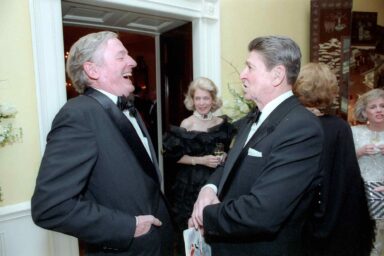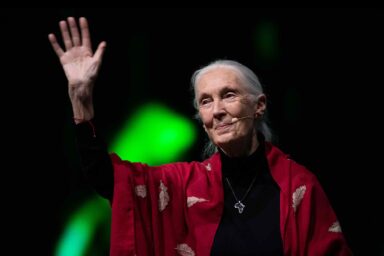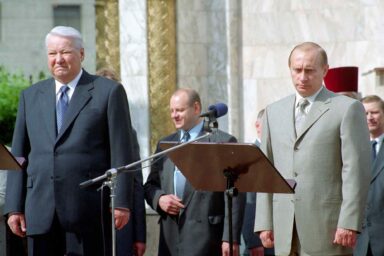The Full Truth about 9/11 Would Change US-Saudi Relationship, Graham Says
According to former Sen. Bob Graham, co-chair of the Congressional Joint Inquiry into 9/11, there is still so much that’s been hidden from the public. Once it is all revealed, the US-Saudi relationship will change dramatically.
Fifteen years after 9/11, there is still much we don’t know. According to former Sen. Bob Graham (D-FL), who chaired the Senate Select Committee on Intelligence and co-chaired the Congressional Joint Inquiry, the recently released “28 Pages” of classified information about the Saudi connection is “only the cork out of the bottle.”
Graham talks to WhoWhatWhy’s Jeff Schechtman about the tens of thousands of pages of FBI documents that have not seen the light of day. He discusses why the Bush administration hid them and why the Obama administration continues the cover-up.
Graham believes that eventually the information will come out and that it will completely “recalibrate” our relationship with Saudi Arabia and with the entire Middle East.
Click HERE to Download Mp3
Full Text Transcript:
Jeff Schechtman: Welcome to Radio WhoWhatWhy. I’m Jeff Schechtman.
As we mark the 15th anniversary of the attacks on 9/11/2001, it’s important to note that there are still so many questions about the attack and about those responsible and specifically about Saudi involvement in those attacks. More importantly, the effort goes on to continue to try and ferret out that information. Doing so has been a two front battle. On one front it’s been former Florida Senator Bob Graham, the former co-chair of the Senate Select Committee on Intelligence and the co-chair of the Congressional Joint Inquiry into the events of 9/11. Also engaged in that effort have been many dedicated journalists. At a time when so many journalists have abdicated their responsibilities in this election season, it’s more than well worth noting how many have been inspired by Senator Graham to do their job in this effort. We’re going to try and continue in that spirit of joined effort today, as it is my pleasure to welcome former Senator Bob Graham to the program. Senator, thanks for joining us.
Senator Bob Graham: Jeff, thank you. Thank you for those very generous words. I think I should hang up. It can’t get any better than it is now.
Jeff Schechtman: Thank you so much! I want to start at the obvious place, the recent release of these 28 pages that had been classified for so long from the 9/11 report and something that you’ve said with respect to this, that those 28 pages are really not the end of anything but they’re the beginning. Or as you said, it’s like taking the cork out of a bottle.
Senator Bob Graham: Yes. There have been some attempts, particularly from representatives of the kingdom of Saudi Arabia to say this is the end, it’s all over, let’s move on. I think anything but, that releasing the 28 pages was a necessary precondition to getting at the literally thousands if not millions of pages of documents that have also been suppressed. I do use the analogy the 28 pages were the cork, and the other information is what’s in the bottle and I hope that we will immediately turn to getting that bottle emptied.
Jeff Schechtman: In order to get the bottle emptied, do we need to understand the reasons why these 28 pages were kept secret for so long and really what lies at the heart of that?
Senator Bob Graham: I think there’s been somewhat of a rolling answer to that question. I think the initial reason was because the Bush Administration had determined that it wanted to go to war with Iraq. It needed an excuse to do that. It looked to 9/11 as being that excuse. As you recall at the time, they were suggesting that there were meetings between officials of Saddam Hussein’s government and the hijackers in Prague, Czechoslovakia. I think the real reason was because … the papers were suppressed was because it would be very embarrassing to the Bush Administration to have public all the ties that existed between the 9/11 hijackers and Saudi Arabia and virtually zero ties to Iraq and yet say: “We’re going to go to war with Iraq and forget about Saudi Arabia.” So the answer to that dilemma was let’s just bury all the information about the Saudi role and that has occurred now since 9/11. I think the Obama Administration’s principle concern was the state of affairs in the Middle East, which is chaos with wars in places like Yemen, Syria, Iraq and with religious conflicts in many other places and they just didn’t want to add another complexity to the already steaming pot of issues going on in the Middle East.
Jeff Schechtman: One of the most difficult institutions to get information from, and you’ve dealt with this personally, has been getting the FBI to be straightforward about this. Why have they been so difficult, and where did their instructions come from?
Senator Bob Graham: I think their instructions came primarily from the White House. The reason I conclude that is what the FBI was doing maybe was somewhat more visible, but was essentially the same as was being done at the State Department, the Treasury Department, the Intelligence Community. And I don’t think all those agencies would be playing off the same sheet of music unless they had one composer to whom they were responsible, and that composer was the president of the United States.
Jeff Schechtman: Given that it’s taken 14 years to get these 28 pages, why should we think that it’s going to be any easier to get the tens of thousands of pages, the FBI field notes, and all the other documentation you’ve talked about that’s out there?
Senator Bob Graham: I’m not naïve about this. I’m not prepared to say it’s going to be a cakewalk now, but the 28 pages are released to get all the rest of the information. I’m anticipating some of the same resistance that we’ve experienced over a decade and a half. I am encouraged, however, by some developments, one of which occurred today. The House of Representatives by a unanimous vote, adopted what’s called the JASTA legislation, which essentially will facilitate the victims of 9/11, such as primarily the families of a loved one, ability to litigate against Saudi Arabia in a US court. If that comes to be, it will require now attention by the president. If it comes to be, I think not only will the injured Americans get justice, but also the courtroom will be a very valuable laboratory to find out just what went on before, during and after 9/11. Another reason why I think it’s important is that the Saudis had appeared to have interpreted the nonresponse of the United States; the suppression of the information about them as being impunity and they’ve used that impunity to continue funding terrorist organizations and providing training for the next generation of terrorists in Wahhabi mosques and schools, all of which are very adverse to US interest.
Jeff Schechtman: If as you hope more of this information comes out – and there is even a federal judge in South Florida now that’s reviewing tens of thousands of pages of these documents – as more and more of this comes out, and if it continues to show these relationships between the Saudis and the events of 9/11 and the 19 hijackers, what do you think the broader national security implications of that might be?
Senator Bob Graham: One would be to recalibrate our relationship with Saudi Arabia which, since World War II, has been one in which the United States agreed to provide security and military support to Saudi Arabia; Saudi Arabia would provide us with a reliable source of petroleum. I think those days are now over. The United States is becoming more energy independent and from our perspective, Saudi oil, while still important in the short range, is probably on the declining slope in terms of its significance to the United States. I think that we need to review some 115 billion dollars of sales to Saudi Arabia for their military adventures, including now, the slaughter of thousands of civilians in Yemen. Those are just the beginnings of what I think a realistic assessment of their reliability of Saudi Arabia as a faithful ally will mean for the United States.
Jeff Schechtman: What impact do you see this having in terms of the cynicism that we see, and certainly we see it playing out in this election cycle, that people have with respect to democracy and secrecy and lack of transparency in government?
Senator Bob Graham: I think that’s an extremely important part of this equation. The American people, back over 200 years ago established a nation which was based on the principle that it was of, by and for the people. To make that principle real, the government needs to be transparent. It needs to tell the American people what it is doing in their name. That principle has been broken and the relationship with information on Saudi Arabia is maybe the most obvious example of that brokenness. And I believe as you suggest, that this has caused millions of Americans to become extremely cynical and suspicious of their own federal government and are showing that in the way they are approaching the presidential elections. I think that solving this issue with Saudi Arabia will be, hopefully the beginning of a new era in which the United States reverts to its traditions of openness between the government and the people and we also return to an era in which the people had fundamental confidence in the government and therefore would support it as it undertook challenges, whether they be the challenges of war or the challenges of a peaceful nation.
Jeff Schechtman: Is the other side of that though, that information that could come out as a result of this effort at transparency, information that will make people even more cynical and more distrustful of their government?
Senator Bob Graham: Well, I certainly don’t think that we should adopt a policy that we don’t trust the judgement of the American people. Unfortunately, the head of the CIA on a recent Meet the Press interview essentially said we shouldn’t release the 28 pages because the American people can’t understand it. Well, I think that’s abysmal commentary by an important figure in the United States government. I trust the American people and I think in the final analysis, it’s only that trust in the people that sustains democracy.
Jeff Schechtman: And is there anything that the Obama Administration can do in its remaining days that would help move this forward?
Senator Bob Graham: Yes. One would be to sign the JASTA bill, which will soon be arriving on his desk, having passed unanimously, both the House and the Senate. I mean, a mother’s day resolution doesn’t pass the Congress unanimously anymore. The fact that JASTA, the justice against the terrorism act did pass unanimously, is an example of the depth of Congress’s feelings towards making this information available to the people and providing a form of justice for the victims of 9/11, so that’s one thing the president could do. Second would be to direct his agencies to release the information that they’re currently suppressing that will give us more information about 9/11. Some of that information is in the national archives, where the reports from the 9/11 Citizens Commission are located. Some of it is in the executive agencies such as the FBI and the CIA. All that information – with very rare exceptions where there is truly a national security interest – ought to be made available to the people.
Jeff Schechtman: And finally, Senator, why do you think more of your colleagues have not come forward on these issues that you’ve been so passionate about?
Senator Bob Graham: I can’t answer for others. In fact, there’s been a growing number of persons who were and are now in the Congress who support this. You wouldn’t have gotten a unanimous vote for the JASTA bill in both the Senate and the House unless there was an overwhelming understanding of why it was important for our security, for our justice, for our democracy, to release this information to the American people.
Jeff Schechtman: Senator Bob Graham, thanks so much for spending time with us here today on Radio WhoWhatWhy.
Senator Bob Graham: Thank you very much, appreciate the opportunity.
Jeff Schechtman: Thank you for listening and joining us here on Radio WhoWhatWhy. I hope you join us next week for another Radio WhoWhatWhy podcast. I’m Jeff Schechtman.
If you liked this podcast, please feel free to share and help others find it by rating and reviewing it on iTunes. You can also support this podcast and all the work we do by going to WhoWhatWhy.org/donate.
Related front page panorama photo credit: Adapted by WhoWhatWhy from Manhattan (9/11 Photos / Flickr – CC BY 2.0), Bob Graham (Public.Resource.Org / Flickr – CC BY 2.0) and Saudis (Mohamed El Dahshan / Flickr – CC BY-NC 2.0)





